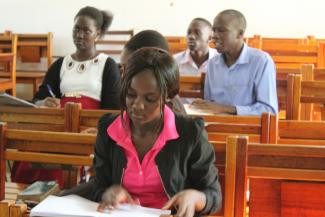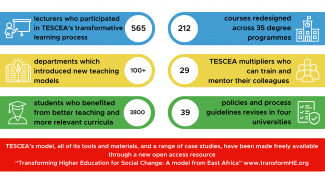
How TESCEA made learning more relevant and built new partnerships for employability and social impact
Download publication files
East Africa’s young people are bursting with talent, but employers warn that graduates are not meeting the needs of labour markets. Enrolments have risen rapidly, but quality has suffered. Students, graduates, communities, employers, and governments are frustrated. In economies with few opportunities for formal, professional employment, many graduates will need to become creators of economic activity and employment, through their own entrepreneurial ventures, or through working with smaller local businesses.
Universities must ensure that their teaching equips their students not only to secure a job when they graduate, but to adapt as new jobs emerge in new industries, and as their communities look to them to serve them in new ways. An insufficient focus on critical thinking, problem solving and other 21st century skills and competencies is a major constraint, as are the barriers to learning faced by young women.
Universities recognise the need to improve the quality and relevance of their curricula, to rethink pedagogies and to build stronger connections with communities and industries, but solutions need to move beyond islands of good teaching and to bring about change at scale. For deeper and more sustained transformation to occur, new ways of thinking and working need to be institutionalised in the fabric of universities – their policies, processes and culture – and in their outward relationships with stakeholders.
From 2018-2021 the TESCEA partnership brought together four universities, faculty development experts, social entrepreneurs, and experts in learning and capacity strengthening in a project to devise new methods of improving the quality and relevance of undergraduate teaching in East Africa. We have a tried and tested approach, that has generated evidence of significant change, and are now preparing to take this to scale.

